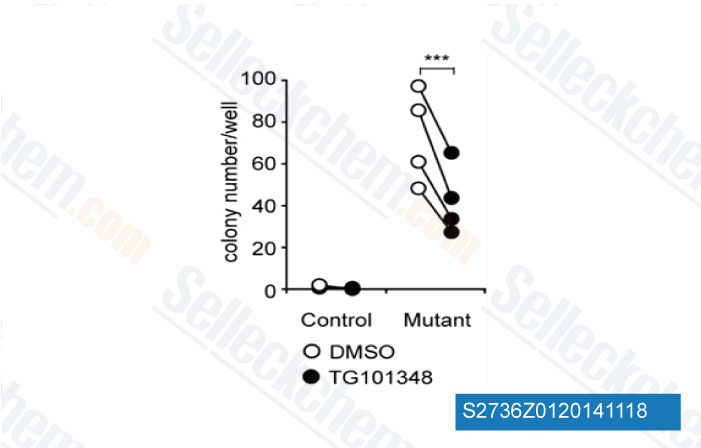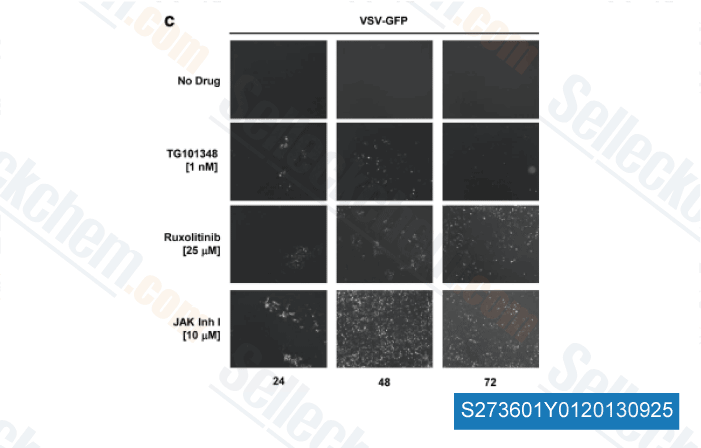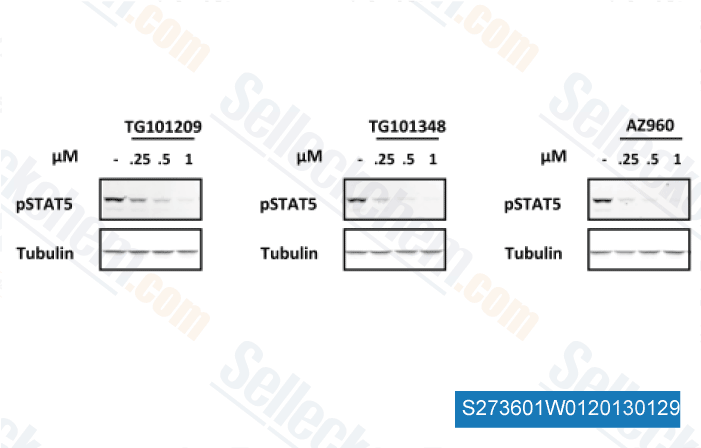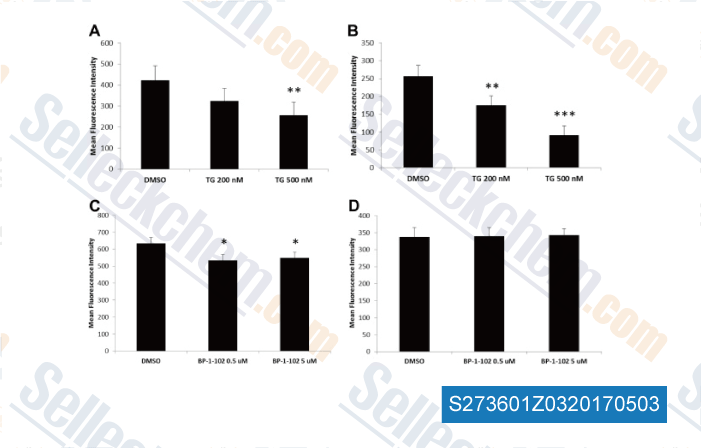|
Toll Free: (877) 796-6397 -- USA and Canada only -- |
Fax: +1-832-582-8590 Orders: +1-832-582-8158 |
Tech Support: +1-832-582-8158 Ext:3 Please provide your Order Number in the email. |
Technical Data
| Formula | C27H36N6O3S |
||||||
| Molecular Weight | 524.68 | CAS No. | 936091-26-8 | ||||
| Solubility (25°C)* | In vitro | DMSO | 100 mg/mL (190.59 mM) | ||||
| Water | Insoluble | ||||||
| Ethanol | Insoluble | ||||||
| In vivo (Add solvents to the product individually and in order) |
|
||||||
|
* <1 mg/ml means slightly soluble or insoluble. * Please note that Selleck tests the solubility of all compounds in-house, and the actual solubility may differ slightly from published values. This is normal and is due to slight batch-to-batch variations. * Room temperature shipping (Stability testing shows this product can be shipped without any cooling measures.) |
|||||||
Preparing Stock Solutions
Biological Activity
| Description | Fedratinib (SAR302503, TG101348) is a selective inhibitor of JAK2 with IC50 of 3 nM in cell-free assays, 35- and 334-fold more selective for JAK2 versus JAK1 and JAK3. It also inhibits FMS-like tyrosine kinase 3 (FLT3) and RET (c-RET) with IC50 of 15 nM and 48 nM, respectively. This compound has potential antineoplastic activity, inhibits proliferation and induces apoptosis. Phase 2. | ||||||||
|---|---|---|---|---|---|---|---|---|---|
| Targets |
|
||||||||
| In vitro | Fedratinib (TG101348) significantly inhibits JAK2 V617F, Flt3, and Ret with IC50 of 3 nM, 15 nM, and 48 nM, respectively. This compound has an IC50 ~300-fold higher for the closely related JAK3 and is a less potent inhibitor of the JAK1 and TYK2 family members. It inhibits proliferation of a human erythroblast leukemia (HEL) cell line that harbors the JAK2V617F mutation, as well as a murine pro-B cell line expressing human JAK2V617F (Ba/F3 JAK2V617F), with IC50 of 305 nM and 270 nM, respectively. TG-101348 also inhibits proliferation of parental Ba/F3 cells to a comparable level, with IC50 of ~420 nM. Its treatment reduces STAT5 phosphorylation at concentrations that parallel the concentrations required to inhibit cell proliferation. TG101348 induces apoptosis in both HEL and Ba/F3 JAK2V617F cells in a dose-dependent manner. It does not show proapoptotic activity in control normal human dermal fibroblasts at concentrations up to 10 μM, and the antiproliferative IC50 against fibroblasts is >5 μM. [1] This compound treatment decreases GATA-1 expression, which is associated with erythroid-skewing of JAK2V617F+ progenitor differentiation, and inhibits STAT5 as well as GATA S310 phosphorylation. [2] TG101348 inhibits the proliferation of HMC-1.1 (KITV560G) cells, with somewhat lower potency than HMC-1.2 (KITD816V, KITV560G) cells, with IC50 of 740 nM and 407 nM, respectively. [3] |
||||||||
| In vivo | Fedratinib (TG101348) has potential for efficacious treatment of JAK2V617F-associated myeloproliferative diseases (MPD). In treated animals, there is a statistically significant reduction in hematocrit and leukocyte count, a dose-dependent reduction/elimination of extramedullary hematopoiesis, and, at least in some instances, evidence for attenuation of myelofibrosis, correlated with surrogate endpoints, including reduction/elimination of JAK2V617F disease burden, suppression of endogenous erythroid colony formation, and in vivo inhibition of JAK-STAT signal transduction. There are no apparent toxicities and no effect on T cell number. [1] Oral administration of this compound (120 mg/kg) significantly inhibits PV progenitor erythroid differentiation in vivo. [2] |
Protocol (from reference)
| Kinase Assay: |
|
|---|---|
| Cell Assay: |
|
| Animal Study: |
|
References
|
Customer Product Validation

-
Data from [ Blood , 2014 , 123(20), 3175-84 ]

-
Data from [ Cancer Gene Ther , 2013 , 20, 582-9 ]

-
, , Claude HAAN Université du Luxembour

-
Data from [ , , J Thorac Oncol, 2016, 11(1):62-71 ]
Selleck's Fedratinib (TG101348) Has Been Cited by 104 Publications
| Keloids and inflammation: the crucial role of IL-33 in epidermal changes [ Front Immunol, 2025, 16:1514618] | PubMed: 40230853 |
| Selective JAK2 pathway inhibition enhances anti-leukemic functionality in CD19 CAR-T cells [ Cancer Immunol Immunother, 2025, 74(3):79] | PubMed: 39891728 |
| JAK2 Inhibition Augments the Anti-Proliferation Effects by AKT and MEK Inhibition in Triple-Negative Breast Cancer Cells [ Int J Mol Sci, 2025, 26(13)6139] | PubMed: 40649917 |
| Genetic Variants of the Human Thiamine Transporter (SLC19A3, THTR2)-Potential Relevance in Metabolic Diseases [ Int J Mol Sci, 2025, 26(7)2972] | PubMed: 40243602 |
| The importance of thiamine availability in the thermogenic competency of human adipocytes [ Mol Cell Endocrinol, 2025, 599:112483] | PubMed: 39884417 |
| RSK1 dependency in FLT3-ITD acute myeloid leukemia [ Blood Cancer J, 2024, 14(1):207] | PubMed: 39592591 |
| Extracellular-vesicle-packaged S100A11 from osteosarcoma cells mediates lung premetastatic niche formation by recruiting gMDSCs [ Cell Rep, 2024, 43(2):113751] | PubMed: 38341855 |
| Jiao-tai-wan and its effective component-coptisine alleviate cognitive impairment in db/db mice through the JAK2/STAT3 signaling pathway [ Phytomedicine, 2024, 134:155954] | PubMed: 39178683 |
| Short-chain fatty acid-producing bacterial strains attenuate experimental ulcerative colitis by promoting M2 macrophage polarization via JAK/STAT3/FOXO3 axis inactivation [ J Transl Med, 2024, 22(1):369] | PubMed: 38637862 |
| Short-chain fatty acid-producing bacterial strains attenuate experimental ulcerative colitis by promoting M2 macrophage polarization via JAK/STAT3/FOXO3 axis inactivation [ J Transl Med, 2024, 22(1):369] | PubMed: 38637862 |
RETURN POLICY
Selleck Chemical’s Unconditional Return Policy ensures a smooth online shopping experience for our customers. If you are in any way unsatisfied with your purchase, you may return any item(s) within 7 days of receiving it. In the event of product quality issues, either protocol related or product related problems, you may return any item(s) within 365 days from the original purchase date. Please follow the instructions below when returning products.
SHIPPING AND STORAGE
Selleck products are transported at room temperature. If you receive the product at room temperature, please rest assured, the Selleck Quality Inspection Department has conducted experiments to verify that the normal temperature placement of one month will not affect the biological activity of powder products. After collecting, please store the product according to the requirements described in the datasheet. Most Selleck products are stable under the recommended conditions.
NOT FOR HUMAN, VETERINARY DIAGNOSTIC OR THERAPEUTIC USE.
